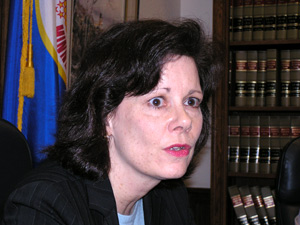March 30, 2005
 |
| Hatch's chief deputy, Kris Eiden, says the lottery language in the Minnesota Constitution refers to ticket-generating activities, not slot machines. Eiden says her office also researched the legislative intent of the constitutional amendment. (MPR Photo/Michael Khoo) |
St. Paul, Minn. — Attorney General Hatch's opinion comes in response to a DFL lawmaker who sought guidance on the gambling proposals currently moving through the legislature. The governor's plan, for example, would have the state Lottery own and operate 4,000 slot machines and other games of chance, including, perhaps, roulette and craps, at a new Twin-Cities casino. The proceeds would be split between the state and its three partner tribes. But Hatch's office found that the plan, as currently structured, hits several constitutional snags.
"What they've proposed right now, we believe, is clearly unconstitutional. If they want to move forward with this specific proposal, we think they should be preparing a bill to pose a constitutional amendment to the constitution," said Chief Deputy Attorney General Kristine Eiden.
First, Eiden says that slot machines and games of pure chance do in fact fall under the meaning of "lottery game." But she says the 1988 amendment that created the state lottery authorizes only certain types of lottery games -- such as scratch-off games and Powerball -- and not the casino-style games envisioned in the governor's plan. No authority, no casino.
Eiden also questioned whether the governor's current plan doesn't cede too much control of the games to the state's partner tribes. And, finally, she says the division of gaming revenues in the plan seems to violate another constitutional provision dedicating 40 percent of lottery net proceeds to the Environment and Natural Resources Trust Fund.
Pawlenty Chief of Staff Dan McElroy says he's heard many of these issues raised in the past, and he says the administration feels it's on solid legal ground.
"Of course it will be challenged," he said. "It's been challenged in the other four states that have done it this way. The state was upheld in every case. We have had challenges on a variety of issues. Yes, I expect it to be challenged. Yes, I expect the state to prevail."
But legal experts say it's not clear how the courts would rule if the casino plan draws lawsuits, as is expected if it moves forward.
"It's hard to tell how these things go," says Mary Jane Morrison, who teaches law at Hamline University in St. Paul and has written a book on the Minnesota Constitution. "That's why there're lawyers on both sides. But the attorney general's position is a credible position."
That doesn't mean there's not a whiff of politics at play. McElroy notes that if the casino plan does become law, it will be Hatch's job to defend it against legal challenges, a job that will now be complicated by Hatch's on-the-record opinion that the proposal is constitutionally deficient.
Later, Pawlenty's office released a two-year-old memo from Hatch's declining to weigh in on the constitutionality of a separate issue precisely because of the conflicts it could produce. Morrison says it's possible Hatch's most recent action is politically motivated.
"The attorney general is a separately-elected officer and happens to come from a different party from the governor. And that means that there can be politics in the by-play here," she says.
The attorney general's opinion is specifically directed to the governor's plan, but could also be applied to a proposal to put 3,000 slot machines at the Canterbury Park Racetrack in Shakopee. Those, too, would be overseen by the state Lottery.
Republican Senate Minority Leader Dick Day has been a chief sponsor of the racino plan. He says Hatch's actions are meant to provide cover for Democrats who've traditionally opposed gambling expansion.
"It's kind of a shed that some of the DFL colleagues can hide under and say, 'Ah, now we don't need to vote. Mike Hatch says it's all illegal,'" Day said.
Hatch's deputy, Kris Eiden, says the issues can all be clarified by putting the matter back before voters in a new constitutional amendement. Day says he'd be happy to do so, but doesn't think he could get DFL support even for that route.





